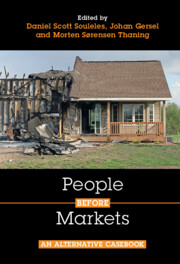Book contents
- People Before Markets
- People Before Markets
- Copyright page
- Dedication
- Contents
- Contents by Topic
- Authors
- 1 Introduction: Why Are You Here?
- 2 Some Philosophical Help with “Neoliberalism”
- Part I Our World
- Part II Our Lives
- Part III Our Work
- 18 What Should a Job Look Like?
- 19 How Should Innovation Work?
- 20 Who Should Get Investment Capital?
- 21 Who Should Own a Business?
- 22 How Should the Government Decide from Whom to Buy Stuff?
- Index
- References
20 - Who Should Get Investment Capital?
from Part III - Our Work
Published online by Cambridge University Press: 27 October 2022
- People Before Markets
- People Before Markets
- Copyright page
- Dedication
- Contents
- Contents by Topic
- Authors
- 1 Introduction: Why Are You Here?
- 2 Some Philosophical Help with “Neoliberalism”
- Part I Our World
- Part II Our Lives
- Part III Our Work
- 18 What Should a Job Look Like?
- 19 How Should Innovation Work?
- 20 Who Should Get Investment Capital?
- 21 Who Should Own a Business?
- 22 How Should the Government Decide from Whom to Buy Stuff?
- Index
- References
Summary
Often when we think about investors we think about a singular heroic individual. This lends itself well to neoliberal ways of imagining people as individual economic agents. In this way of thinking, an entrepreneur with some amount of capital is able to heroically create a business due largely to their own drive, creativity, and hustle. What this accounting misses though, are the historical contexts and social resources that entrepreneurs draw on to make their businesses work. This is a problem too, if we imagine that individual entrepreneurial action will be adequate to pull people out of poverty or to right historical wrongs. In this chapter, Beresford takes us to South Africa to show the different resources that black and white entrepreneurs have when they start their businesses. Due to the legacy of apartheid, white entrepreneurs have access to more capital and deeper support networks that allow them to navigate the earlier, vulnerable stages of a business’s life. By contrast, many black entrepreneurs face a relatively resource poor environment for starting their businesses. Altogether, Beresford shows the limits of individualized thinking when it comes to entrepreneurs, and for using entrepreneurship to lift people out of poverty. The chapter also questions the theoretical assurance of neoliberalism that government should not intervene, but rather wait for the superior knowledge embedded in the market mechanisms to weed out the bad, and adequately increase the chances that good solutions flourish.
- Type
- Chapter
- Information
- People before MarketsAn Alternative Casebook, pp. 427 - 445Publisher: Cambridge University PressPrint publication year: 2022

